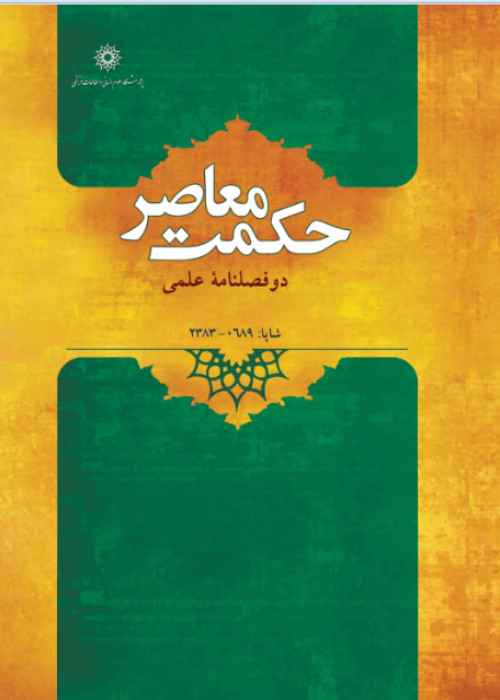Rereading the Referent of “Khazāʾin” according to Philosophical Exegeses and Principles of the Transcendent Philosophy
There are Quranic verses that cannot be interpreted without rational or intellectual exegeses and merely by drawing on their prima facie meanings, such as those that do not square with explicit Quranic doctrines, including those in which “hands” or “face” are attributed to God. Another group of verses of a similar vein are those concerning “treasuries of Allah” (khazāʾin Allāh). The predicament is that people tend to collect valuable things in treasuries only because they have a limited power and cannot have what they want whenever they do, but this is not true of God, because of His unlimited, unconstrained power and knowledge. According to Quranic exegetes, there are two types of “divine treasuries”: Worldly treasuries Otherworldly treasuries (those of the absolute hidden world) There are different views of the nature of “divine treasuries” proposed by exegetes of the Quran and Muslim philosophers. We begin with views propounded by Quranic exegetes in philosophical-theological exegeses of the Quran. Major views of this sort have been offered in the exegesis of verse 21 of Sura al-Hijr in the Quran. These views might be classified into four: Rains Material elements and occasions of creation Divine predestinations Divine knowledge In a number of his exegetical and philosophical works, Mullā Ṣadrā has presented his account of “divine treasuries.” In line with his philosophical principles, he construes divine treasuries as intellectual entities; that is, as a particular stage of divine knowledge (after that of divine grace or ʿināyat), which mediates the emanation of divine blessings or grace to creatures—a stage in which the forms of everything inheres in an intellectual way. A systematic, rational rendering of Mullā Ṣadrā’s account of divine treasuries requires a proper elaboration of his philosophical principles associated with divine knowledge, including the primacy of existence (iṣālat al-wujūd), gradation of existence (tashkīk al-wujūd), objectivity of knowledge and existence, etc. The following are the questions we consider in this paper: How do theological exegeses of the Quran account for the notion of “divine treasuries”? What problems do they face? What are Mullā Ṣadrā’s philosophical principles underlying his account of divine treasuries? How does his account treat the problems faced by other accounts? What other account of divine treasuries might be yielded, which is still compatible with the principles of Mullā Ṣadrā’s philosophy? To answer these questions, we begin with a literal definition of “treasuries of Allah” and then overview the accounts provided by exegetes and their problems. Next, we offer a detailed account of Mullā Ṣadrā’s philosophical principles as preliminary to a proper account of “divine treasuries.” Articles have been published about “divine treasuries,” including “Divine treasuries” by Muḥammad Ḥusayn Ḥishmatpūr (2005), “A critical analysis of Mullā Ṣadrā’s view of treasuries in light of structural semantics” by Mahdī Bāqirī and Aḥad Farāmarz Qarāmalikī (2018) and “A critical application of the theory of conceptual mixture in al-Mīzān’s reading of divine treasuries” again by Mahdī Bāqirī and Aḥad Farāmarz Qarāmalikī (2017). We conclude that, of the four accounts outlined in this paper, the first three suffer from numerous problems, and thus they fail to yield an adequate account of the Quranic notion of divine treasuries. In our view, the fourth view—that is, Mullā Ṣadrā’s philosophical account—has failed to offer a full-fledged account of instances of divine treasuries. Accordingly, we propounded a fourth view, which is an extension of Mullā Ṣadrā’s account. We argue how a proper, reasonable account of the notion of divine treasuries can be made possible by an elaboration of Mullā Ṣadrā’s philosophical principles concerning divine knowledge and its degrees, and by drawing on characteristics of divine treasuries as outlined in the Quran, particularly verse 21 of Sura al-Hijr. We show that this revised Sadraean account is immune to the objections raised against other theories. On this account, divine treasuries suggest God’s knowledge of the measures of everything before its descent; that is, its creation. Moreover, on Mullā Ṣadrā’s principles, treasuries are of two sorts: worldly and otherworldly, where the latter is of two kinds in turn: objective and subjective (or cognitive). Objective treasuries are entities existing in imaginal (mithāl) and intellectual (ʿaql) worlds, and subjective treasuries are entities existing in the world of divine names and attributes. This is an “existential account of divine treasuries,” which might apply to all degrees of existence and creation.
- حق عضویت دریافتی صرف حمایت از نشریات عضو و نگهداری، تکمیل و توسعه مگیران میشود.
- پرداخت حق اشتراک و دانلود مقالات اجازه بازنشر آن در سایر رسانههای چاپی و دیجیتال را به کاربر نمیدهد.



